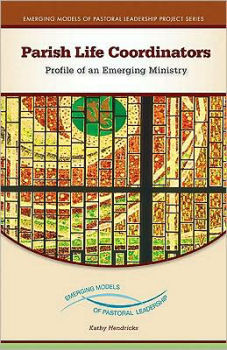
|
Posted April 23, 2009
Book: Parish Life Coordinators: Profile of an Emerging Ministry Author: Kathy Hendricks Loyola Press, Chicago, IL. 2009. Pp. 105 An Excerpt from the Jacket:
An Excerpt from the Book: Balance and Self-Assessment All pastoral ministers are subject to the danger of burnout, but maybe none more so than the pastoral leader. There is a growing recognition that PLCs, like priest-pastors, need to go on an annual retreat that has been funded by the parish or diocese. The Emerging Models Project report, however, reveals that only fifty-six percent of PLCs currently have this as a benefit. In the book Spiritual Direction, Henri Nouwen uses the image of a wagon wheel to depict the ideal integration necessary for pastoral ministry. He describes the hub as “communion with God in our heart.” It connects with the many spokes of community and outward to the rim of the wheel of ministry. When we are too active in ministry, we end up on the rim, trying to take care of everybody’s needs all the time. He notes that God invites us to both start and live in the hub. In this way, we stay connected with the spokes. Then “when [we] get to the rim, [we] won’t have to run so fast.” Living in the hub, where they find a place for prayer, rest, and reflection, enables PLCs, sacramental ministers, and all who work to provide pastoral care to a community as a way to stop spinning their wheels and get to the heart of caring, effective, and faithful ministry. In addition to evaluations conducted with staff and/or other pastoral leaders, parish life coordinators need time for self-assessment. Even if a retreat is not provided in a PLC’s benefit package, it is crucial to claim such time — as a way to undertake a personal evaluation and to discern one’s continued commitment to the role. In his book, Leadership Jazz Max DePree notes the importance of polishing one’s gifts. It is an especially pertinent image for pastoral ministry because it entails reflection and a commitment to self-knowledge and growth. “Polishing gifts begins by reflecting on how to design the ways in which you as a leader . . .will work toward your potential.” It requires one to think expansively, to develop one’s voice, and to unlearn routines that generate stagnation in a leadership role. Table of Contents: 1. What is the Canon 517.2 model? 2. Who are PLCs and what do they do? 3. Where to find a PLC parish 4. Implementing the Canon 517.2 model 5. Making the Canon 517.2 work 6. The future of the Canon 517.2 model |
|
